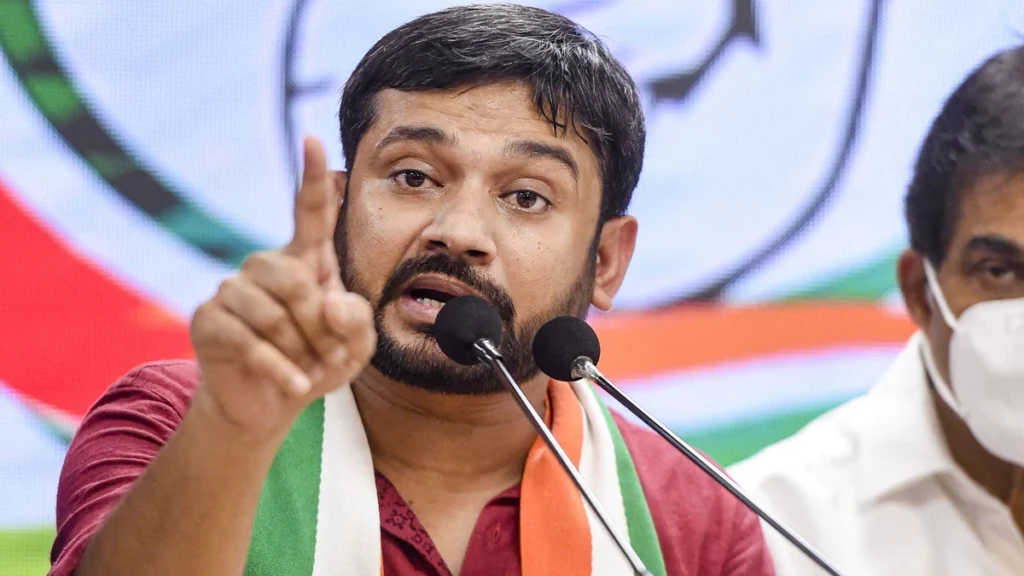Kanhaiya Kumar, a prominent Indian student leader and politician, has emerged as a significant figure in contemporary Indian politics. Born on January 14, 1987, in the small town of Bihat in Bihar, Kumar’s journey from a student activist to a national leader reflects the changing dynamics of youth politics in India. His story is not just about personal ambition but is intricately tied to broader socio-political movements that resonate with the aspirations and frustrations of millions of young Indians.

Early Life and Education
Kanhaiya Kumar grew up in a modest family. His father, a farmer, and mother, a school teacher, instilled in him the values of education and hard work. After completing his schooling, he moved to Delhi to pursue higher education at Jawaharlal Nehru University (JNU), one of India’s premier institutions known for its liberal and progressive ethos.
At JNU, Kumar quickly became involved in student politics, joining the All India Students’ Federation (AISF). His oratory skills, charisma, and ability to connect with students made him a popular figure. He was elected president of the JNU Students’ Union in 2015, a position that amplified his voice and influence on campus.
Rise to Prominence
Kumar gained national attention in 2016 when he was arrested on charges of sedition for allegedly raising anti-national slogans during a protest against the execution of Afzal Guru, a convicted terrorist. His arrest sparked widespread outrage and protests across India, positioning him as a symbol of resistance against what many perceived as authoritarianism and a clampdown on dissent.
During his time in jail, Kumar’s supporters rallied for his release, arguing that the charges were politically motivated and an attack on free speech. Upon his release, he gave a stirring speech that captured the imagination of many, emphasizing the need for unity, justice, and the protection of democratic rights. His ability to articulate the concerns of young Indians — including unemployment, educational reforms, and social justice — resonated widely, leading to his status as a youth icon.
Political Ideology and Activism
Kumar’s political ideology is rooted in leftist thought, emphasizing social justice, secularism, and anti-communalism. He has been a vocal critic of the ruling Bharatiya Janata Party (BJP) and its policies, particularly those perceived as divisive or detrimental to the fabric of Indian society. His activism extends beyond JNU, addressing issues like caste discrimination, gender equality, and economic disparities.
Kumar’s speeches often invoke historical figures such as Bhagat Singh and Dr. B.R. Ambedkar, linking their struggles for justice and equality to contemporary issues. His ability to weave history into his narratives not only educates his audience but also instills a sense of pride in India’s diverse and pluralistic heritage.
Electoral Politics and Future Prospects
In 2021, Kanhaiya Kumar joined the Communist Party of India (CPI) and subsequently contested the 2021 Bihar Legislative Assembly elections from the Begusarai constituency. Although he did not win, his campaign focused on local issues, highlighting the struggles of farmers, workers, and the youth. His foray into electoral politics marked a significant shift, as he sought to bridge the gap between student activism and mainstream political engagement.
Kumar’s future in politics seems promising, as he continues to garner support from the youth and marginalized communities. His ability to articulate a vision of inclusive growth and social justice positions him as a potential leader in the opposition against the BJP’s hegemony.
Criticism and Challenges
Despite his popularity, Kanhaiya Kumar has faced criticism from various quarters. Some detractors argue that his leftist ideology may not resonate with a broader electorate, particularly in a country where nationalism and economic development dominate the political narrative. Additionally, the internal dynamics within leftist parties and their declining influence in Indian politics pose challenges for his long-term ambitions.
Moreover, Kumar’s rise has also attracted the attention of right-wing groups that view him as a threat. He has faced numerous threats and attacks, underscoring the polarized nature of Indian politics today. Navigating this complex landscape will require strategic acumen and resilience.
Kanhaiya Kumar: A Voice of Change
Kanhaiya Kumar represents a new generation of political leaders in India — one that is articulate, passionate, and deeply connected to the aspirations of young people. His journey from a student leader to a national figure encapsulates the challenges and possibilities that lie ahead for Indian democracy. As the country grapples with pressing issues such as unemployment, social inequality, and democratic rights, Kumar’s voice may continue to resonate, inspiring a movement for change.
His story is still unfolding, and while the road ahead may be fraught with challenges, Kanhaiya Kumar’s commitment to his ideals and his ability to engage with the youth will be pivotal in shaping the future of Indian politics. As the nation stands at a crossroads, leaders like Kumar remind us of the power of youth activism and the enduring struggle for justice and equality.


